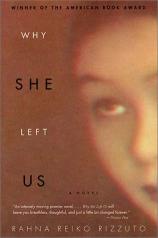Reading Group Guide
Discussion Questions
Why She Left Us

1. The story in Why She Left Us is told by different narrators, but we never hear from Emi herself. Why do you think the novelist made this narrative choice? Was it a good choice?
2. In the end, we never learn why Emi totally rejects her son, Eric. Does this omission make the story stronger or weaker?
3. Why does Rizzuto move back and forth in time when telling her story rather than use a more chronological narrative?
4. How well does Rizzuto create the different voices of her four narrators?
5. Kaori rescues Eric from his adoptive home because she feels that family ties cannot be severed, yet at the same time, the family spurns and alienates Emi for her actions. Discuss this seemingly contradictory, complicated response to the bonds of family.
6. Why do Emi's brothers so willingly become soldiers and fight for a country that is, at the same time, treating their people as prisoners of war?
7. Which generation seems to face the biggest obstacles-the Japanese immigrants Kaori and her husband; their children, Emi, Will, and Jack who are both Japanese and American; or the fully American generation of Eric and Mariko?
8. Are the events and secrets that fuel the novel a unique by-product of the war and the internment or could they have happened anyway?
9. Discuss the different ways the older generation of Japanese immigrants and the younger generation of their American-born children react and respond to the internment.
10. Rizzuto has said that she feels Emi's silence is believable because she does what many Japanese-Americans do-puts a painful event behind her and pretends it didn't happen. How might characters from other cultures have dealt with the events that take place in the novel?
11. Rizzuto's great-uncle once told her that the Second World War was "the best thing that happened to the Japanese-Americans" because it broke down the pre-war ghettoization. Because they had "proven" themselves during the war, the Japanese finally could become citizens, marry white persons, and fully integrate into American culture. What to you think Japanese-Americans might have gained and what might they have lost because of this change?
12. There is a painful moment in the novel when an old Japanese woman, forced to use the communal latrine at the camp, puts a paper bag over her head. How does this act serve as a metaphor for the confusion and shame the Japanese-Americans must have felt when they were interned?
13. Are the members of the Okada family swept along by the events of history, or do they have some control over their own fates?
14. At novel's end, do you come away with a clear idea of "why she left us?"
Why She Left Us
- Publication Date: September 5, 2000
- Paperback: 304 pages
- Publisher: Harper Perennial
- ISBN-10: 0060931825
- ISBN-13: 9780060931827






